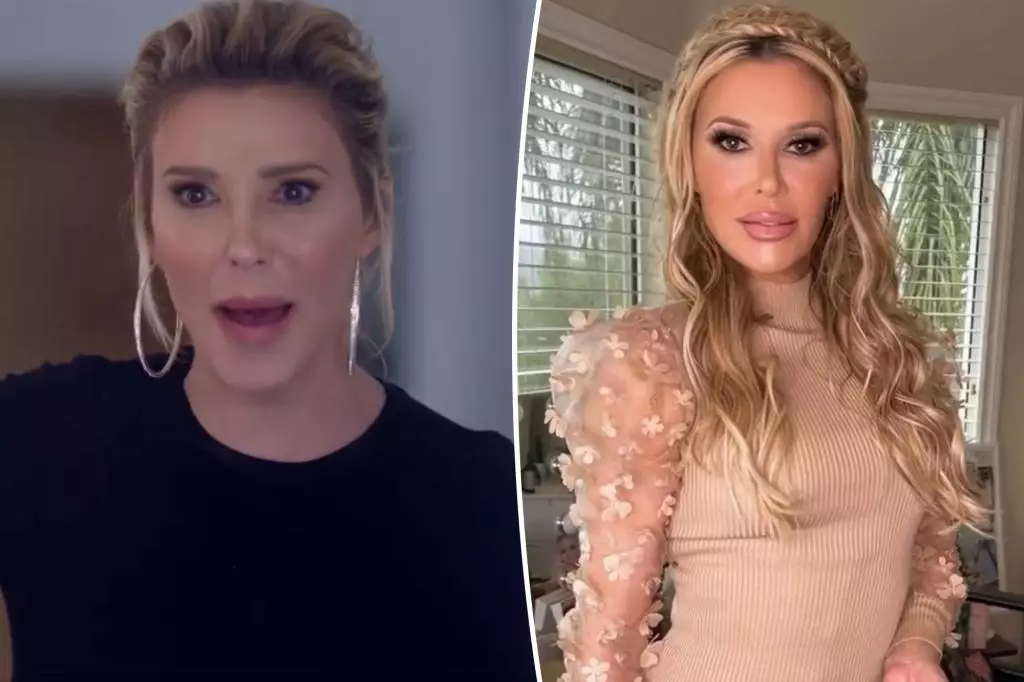Brandi Glanville, an infamous figure from the reality television landscape, has once again found herself at the center of a controversy that raises questions about workplace conduct within the entertainment industry. With accusations of sexual harassment levied against Bravo’s executive producer, Andy Cohen, Glanville’s recent revelations have ignited discussions surrounding power dynamics in Hollywood, the legal system’s role in navigating such cases, and the responsibilities of network executives. As the former star of “The Real Housewives of Beverly Hills,” Glanville’s claims not only challenge the treatment of women in reality television but also highlight the often murky waters of celebrity relationships and legal accountability.
In a series of podium declarations and social media posts, Glanville expressed disappointment and frustration over her legal representation, claiming they “cut ties” amid the looming case. In a since-deleted post, she voiced her discontent, implying that potential financial motives may have influenced her lawyers’ decision to back out. Her legal team initially sent a letter to NBC Studios and related companies, asserting that Cohen engaged in inappropriate behavior and made sexually charged comments in a video sent to her in 2022. This revelation is critical, as it brings to light potential abuse of power, emphasizing that Cohen, who held considerable sway over Glanville’s career, allegedly crossed professional boundaries.
The details from the letter suggest a serious breach of conduct, as Cohen reportedly expressed a desire to engage in sexual activities while under the influence. This raises significant ethical questions, particularly regarding how professional relationships can be exploited and whether those in positions of power can manipulate such situations for personal gratification. Given the context, understanding the dynamics between Glanville and Cohen becomes crucial; power imbalances in the workplace often influence victims’ responses and the reporting of such incidents.
Cohen’s response, wherein he characterized his remarks as an “inappropriate joke,” creates an unsettling dichotomy between perception and reality. While he acknowledged the comments were not suitable, he attempted to downplay the severity of the situation by framing it as humor shared among friends. This response exemplifies a common tactic in the entertainment industry, where powerful figures may dismiss serious allegations as misunderstandings or hyperbole. The reference to Kate Chastain volunteering as the context of humor further muddies the waters, showcasing how camaraderie can be misrepresented when power dynamics are skewed.
Public reactions to the allegations highlight a growing societal awareness concerning consent and appropriate behavior, particularly within entertainment. As audiences become more informed about the implications of harassment and the importance of speaking out, figures like Glanville can play pivotal roles in catalyzing change. However, these issues are compounded by a culture that has historically prioritized profits over accountability.
Adding another layer to this tangled narrative, Caroline Manzo’s separate allegations against Glanville concerning inappropriate contact without consent complicate the broader discussion about safety and accountability in reality TV. Manzo’s decision to sue Bravo instead of Glanville indicates a shift in how these cases can be approached legally, as she seeks to hold the network responsible for fostering an environment where such behaviors may occur. Meanwhile, Glanville has publicly condemned Manzo’s accusations as “absurd,” showcasing the complexities that arise when multiple parties are entangled in similar allegations.
These complications serve as a reminder of the often chaotic relationships between cast members and networks. When stars of reality television engage in disputes, it not only affects their personal reputations but also has broader implications for the industry’s structure. Networks must grapple with their roles in managing and protecting their talent, which is increasingly essential in cultivating a safe and respectful workplace.
Glanville’s ongoing struggle with Bravo is emblematic of a significant moment in the entertainment industry, where issues of consent, power dynamics, and workplace culture are being confronted more directly. As she faces challenges both legally and personally, it reflects a larger narrative that may very well usher in a new era of awareness and advocacy for those who have been silenced or marginalized in similar circumstances. Ultimately, this saga not only involves the individuals at its forefront but also encapsulates the broader dynamics of accountability, safety, and respect within the reality television industry.

